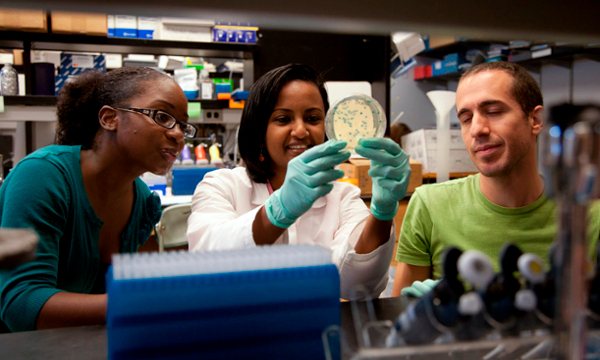Madhav V. Dhodapkar, MBBS
 |
Professor and Anise McDaniel Brock Chair, Department of Hematology and Medical Oncology, School of Medicine
Director, Winship Center for Cancer Immunology
Graduate Programs
- Affiliate Member - Cancer Biology
- Full Member - Immunology and Molecular Pathogenesis
Education
Fellowship, Mayo Clinic, 1994Residency, St. Louis University, 1990
MBBS, All India Institute of Medical Sciences, 1987
Contact Information
Email: madhav.v.dhodapkar@emory.edu
Phone: 404-727-3740
Address:
Emory Clinic Building B, Room B5105
1327 Clifton Road
Atlanta, GA 30322
My laboratory is pursuing research themes at the intersection of three overlapping areas- immune response to human tumors, understanding and manipulating immune system in humans and cross-talk between cancer biology and immunology. We have explored questions in these areas through direct analyses of human immune system in patients, development of advanced humanized mouse models, prospective and interventional studies in humans to manipulate immunity, and interrogation of experiments of nature utilizing advanced genomic and more recently single cell tools.
An important focus of our lab relates to studying the host-tumor interactions in man through studies of a hematologic malignancy, multiple myeloma and its precursor, monoclonal gammopathy of undetermined significance. We are particularly interested in early stages of these malignancies and how the immune response shapes the evolution of these tumors. Our hypothesis is that understanding these basic mechanisms will have fundamental implications for novel strategies to prevent cancer. We are also exploring the biologic and clinical implications of related alterations in B/plasma cell populations in humans, that we believe may impact diverse aspects of human health, including autoimmunity and bone disease, to name a few.
In the context of tumor-immune interactions, we are exploring the regulation of immune enhancing and suppressive mechanisms in the tumor bed, again with a particular focus on early stages of cancer and its precursor states. We are particularly interested in how lipid antigens and microbially-derived products contribute to inflammation in these patients. We are also engaged in large scale collaborative efforts to describe an Atlas of immune cells in human tumor microenvironment.
Finally, we are engaged in several active studies that are exploring novel approaches to manipulate the immune system in the clinic. We were fortunate to be involved in the earliest clinical studies targeting dendritic cells in humans, and more recently PD1 immune checkpoint in human cancer. This includes strategies to manipulate immune checkpoints and redirecting T cells (e.g. via chimeric-antigen receptor expressing T cells or bispecific reagents). Understanding the mechanisms of response and resistance to these agents will provide the next generation of immune-based therapeutics in human cancer.
An important focus of our lab relates to studying the host-tumor interactions in man through studies of a hematologic malignancy, multiple myeloma and its precursor, monoclonal gammopathy of undetermined significance. We are particularly interested in early stages of these malignancies and how the immune response shapes the evolution of these tumors. Our hypothesis is that understanding these basic mechanisms will have fundamental implications for novel strategies to prevent cancer. We are also exploring the biologic and clinical implications of related alterations in B/plasma cell populations in humans, that we believe may impact diverse aspects of human health, including autoimmunity and bone disease, to name a few.
In the context of tumor-immune interactions, we are exploring the regulation of immune enhancing and suppressive mechanisms in the tumor bed, again with a particular focus on early stages of cancer and its precursor states. We are particularly interested in how lipid antigens and microbially-derived products contribute to inflammation in these patients. We are also engaged in large scale collaborative efforts to describe an Atlas of immune cells in human tumor microenvironment.
Finally, we are engaged in several active studies that are exploring novel approaches to manipulate the immune system in the clinic. We were fortunate to be involved in the earliest clinical studies targeting dendritic cells in humans, and more recently PD1 immune checkpoint in human cancer. This includes strategies to manipulate immune checkpoints and redirecting T cells (e.g. via chimeric-antigen receptor expressing T cells or bispecific reagents). Understanding the mechanisms of response and resistance to these agents will provide the next generation of immune-based therapeutics in human cancer.





